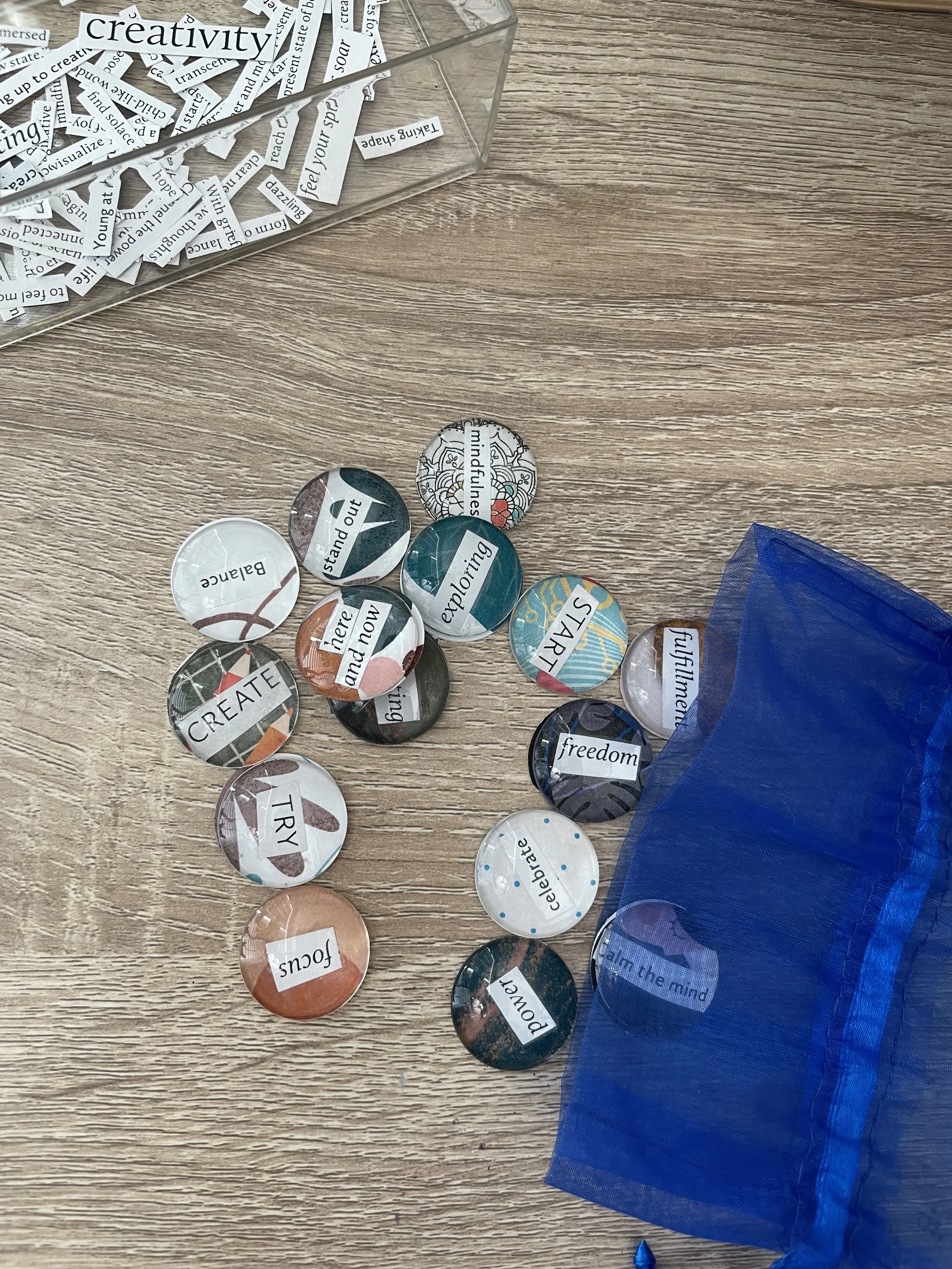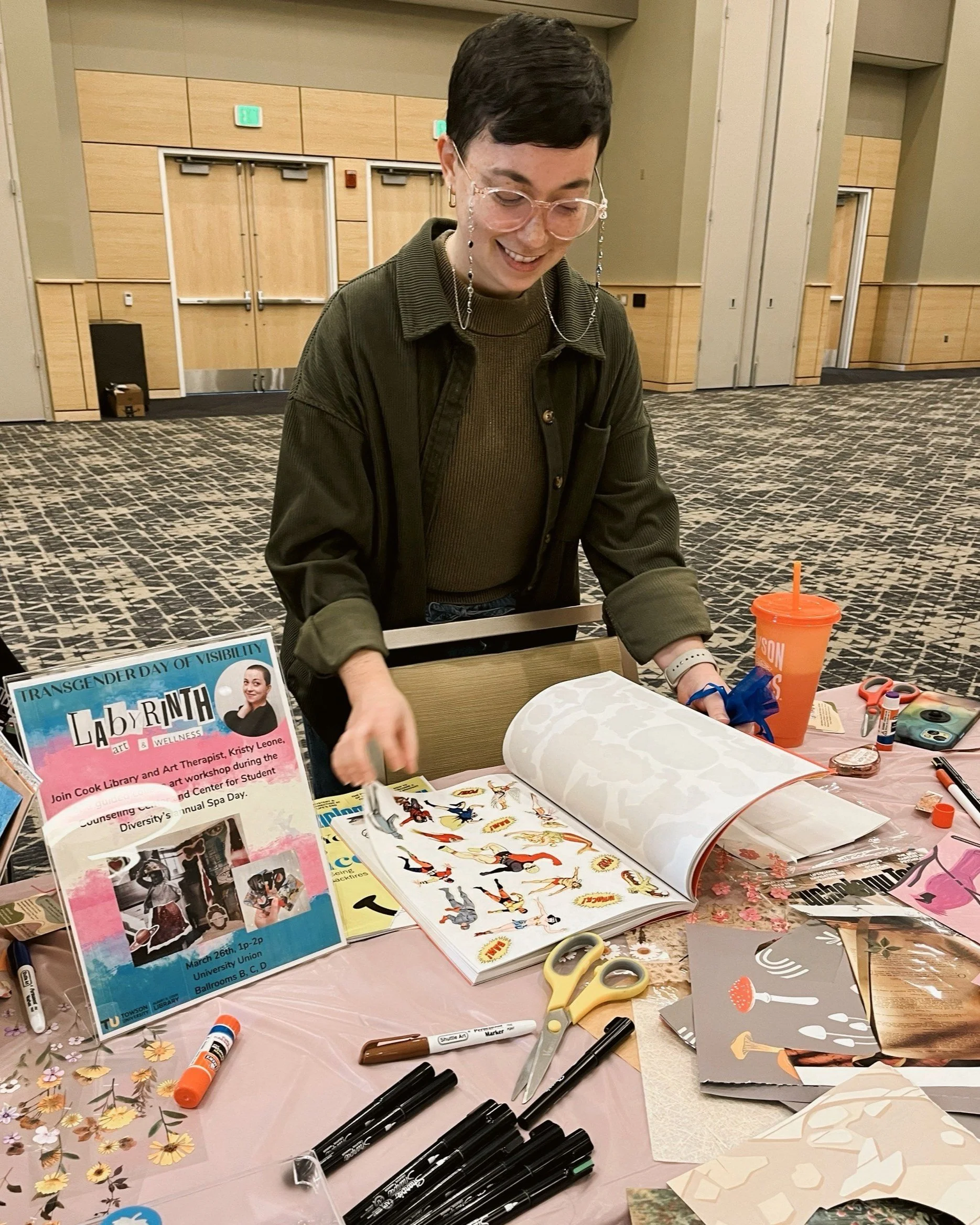Meet Kristy Leone – The Outdoor Art Therapist Providing Creative Mental Health Support in Maryland
My Approach to Therapy: Creative, Affirming, and Nature-Based
Hi! I’m Kristy ‘Tea’ Leone (they/she), LCPC, LCPAT, ATR-BC, nonbinary, neuroaffirming licensed art therapist, artist, outdoor adventurer, and overthinker! I absolutely love the work I do. Every day, I feel grateful to support people of all ages as they navigate their inner worlds.
Helping families reconnect with themselves through art-based interventions and compassionate conversations isn’t just my profession: it feels like both my passion and purpose! My work is rooted in collaboration, self-compassion, and deep respect for the ways people think, feel, and experience the world differently.
To my fellow overthinkers: if you have the capacity to think deeply, you also have the capacity to love deeply, to heal deeply, to grow deeply. Therapy is as much about learning new ways as it is about unlearning old patterns. Together, we’ll explore what’s holding you (or your child) back and gently work toward growth, expression, and connection.
Why I Became an Art Therapist
Even as a child, I was always creating. I made art out of anything I could find: junk mail, fallen branches, hubcaps on the sidewalk. I recall feeling the most alive while telling stories, mixing fairy potions, and performing on stage as a theater kid with wild imagination! While I didn’t know the word for it then, I always dreamed of being some kind of fairy magic-maker: drawing from the textures of everyday life to spark growth, expression, and change!
I began my career at a grief counseling center, helping children and adults process profound loss through creative expression. From there, I taught in schools that had lost their art education funding in Philadelphia, showing kids how to transform scraps and found objects into something meaningful. I painted murals in city neighborhoods, guided young artists into using new materials to enhance self-expression, and relied on art to help (re)build community.
These experiences led me to graduate school program for mental health counseling and art therapy. I graduated from Drexel University in 2019. I’ve worked in behavioral health centers, autism support programs, nursing homes, inpatient hospitals, and schools. Each role gave me new insight into the power of creativity in healing. Eventually, I carved my own path and opened my very own practice, Labyrinth Art & Wellness, a space for growth, transformation, and wholehearted connection!
Values That Shape Me
My professional work is guided by personal values. I believe in showing up with authenticity, honoring each person’s story, and creating a space where all parts of you are welcome. These values reflect both who I am as a therapist and how I move through the world: with curiosity, compassion, and a deep respect for the messy, beautiful work of being human.
-
Collaboration is at the heart of my therapeutic approach.
I believe that the most effective therapy happens when client and therapist work together as equal partners. I value your expertise about your own experiences and perspectives, and I'm here to offer support, guidance, and insight. Together, we'll explore your goals, navigate challenges, and celebrate your achievements.
By fostering a collaborative relationship built on trust and mutual respect, we can co-create a therapeutic journey that is tailored to your unique needs and aspirations. Your voice is essential in shaping our work together, and I'm committed to listening attentively and honoring your autonomy every step of the way.
My favorite therapeutic approach is Acceptance and Commitment Therapy (ACT), which aligns beautifully with my belief in collaboration. ACT emphasizes embracing your thoughts and feelings without judgment, while focusing on actions that are true to your core values. This approach helps you build psychological flexibility by increasing awareness of the present moment and committing to values-driven actions.In addition, I incorporate parts work into our sessions. Parts work involves exploring and understanding the different aspects or “parts” of yourself, such as inner child, inner critic, or different emotional states. This method fosters a collaborative relationship with yourself, allowing you to engage with these parts in a compassionate and integrative way.
Together, ACT and parts work support a dual collaboration—between you and me, and within yourself. This holistic approach encourages you to work harmoniously with your internal experiences while we partner together to navigate challenges and celebrate growth. By honoring your inner dialogues and aligning with your values, we create a therapeutic journey that is both empowering and transformative!
-
In my practice, I approach each aspect intentionally, meaning that I conduct therapy with purpose, mindfulness, and careful consideration. This includes maintaining a limited number of client session spaces in my calendar. This deliberate choice allows me to uphold a shorter caseload, ensuring that each individual receives the focused and personalized care they deserve. By dedicating ample time and attention to each client, I strive to create a supportive and nurturing therapeutic environment where growth and healing can flourish.
-
I am deeply dedicated to fostering inclusivity. I proudly advocate for the rights of BIPOC, LGBTQ+, and trans communities. As a White, queer art therapist, I am keenly aware of the ongoing need to untangle, unlearn, and relearn. My commitment to learn, unlearn, and relearn means embarking on my own inner journey, uncovering conscious and unconscious biases, and actively participating in the transformation of systems that perpetuate oppression and White Supremacy.
This dedication isn't just a professional ethos; it's a personal journey that shapes every aspect of my practice and who I choose to collaborate with.
-
Since a young age, I've fostered a deep connection with nature. Regardless of the weather, I've always found solace and inspiration in spending time outdoors, whether it's walking through forests, foraging for treasures, or simply basking in the stillness of natural landscapes.
Much like navigating a hike, I approach life with a readiness to embrace the unexpected. While we may prepare for our journey, the path ahead often presents unforeseen challenges and obstacles. Yet, it is in these moments of adaptation that we discover our greatest strengths—our ability to innovate and improvise. This spirit of adventure, discovery, and problem-solving is precisely what fuels my passion for artmaking.
It's why I provide walk and talk therapy sessions, as I believe that the natural environment can serve as a powerful backdrop for therapeutic exploration and personal growth. Walking side by side, surrounded by the beauty of nature, we can engage in meaningful conversations and delve into deep introspection, all while benefiting from the calming and rejuvenating effects of being outdoors -
In my creative process, I delight in using found objects, recycled materials, and donated art supplies. Each piece becomes a canvas for exploration, a testament to the beauty and potential found in the everyday. Just as nature offers endless possibilities for inspiration, I aim to infuse my artwork with the same sense of wonder and resourcefulness.
My passion for art extends beyond my therapeutic practice—I have also had the privilege of teaching art classes in various forms. Whether instructing children, adolescents, or adults, I find joy in sharing my love for creativity and guiding others in their artistic journey.
Through these experiences, I have witnessed the transformative power of art in fostering self-expression, building confidence, and nurturing personal growth.
Therapeutic Approaches and Certifications
Acceptance and Commitment Therapy for LGBTQIA+
I use Acceptance and Commitment Therapy (ACT) in a way that’s affirming and grounded in the realities of LGBTQIA+ and neurodivergent experiences.
ACT helps you notice and accept difficult thoughts and feelings (rather than fighting them) and focus on living in alignment with your values. This approach is especially helpful for navigating stress, identity questions, and the impact of stigma. My goal is to offer a space where you can feel fully seen and supported as you connect with what matters most to you. Together, we’ll explore what authenticity looks like for you, and create space for healing, resilience, and self-trust.
Art Therapy for All Ages
I hold a master’s degree in Art Therapy and Counseling from Drexel University (2019), a rigorous program that combined clinical training with a deep understanding of creative expression as a therapeutic tool.
I specialize in using art therapy to support clients experiencing anxiety, chronic worry, and sleep disturbances, especially when traditional talk therapy feels overwhelming or limiting. As both a licensed art therapist and practicing artist, I believe in the healing power of creativity and maintain a personal art practice, which I share with a community of over 10,000 followers on Instagram as part of my ongoing commitment to expressive wellness and mental health advocacy.
Exposure and Response Prevention (ERP) for OCD
I’m trained in Exposure and Response Prevention (ERP), one of the most effective therapies for treating OCD. I completed a 4-Day Intensive Training in ERP with Cognitive Behavioral Institute.
In this approach, I help you gradually face the thoughts or situations that trigger anxiety: without relying on compulsions to feel better. Over time, this reduces the intensity of those fears and gives you more freedom in your daily life. I bring structure, support, and compassion to each step of the process, helping you feel safe while doing hard work. Whether you’re dealing with intrusive thoughts, checking, or mental rituals, we’ll work together to reduce OCD’s grip and build lasting change.
-
LCPC: Licensed Clinical Professional Counselor
LCPAT: Licensed Clinical Professional Art Therapist
ATR-BC: Board-Certified Art Therapist
Board Approved Supervisor for Counselors
Board Approved Supervisor for Art Therapists
Drexel University, Master of Arts (MA) in Art Therapy & Counseling (2019)
Arcadia University, Bachelor of Arts (BA) in Psychology (2017) -
Transgender Day of Visibility Event at Towson University Presented a therapeutic arts workshop for faculty and students of Towson University
Viewing Termination as a Transformation: Development of a Method by Kristy Leone, Master of Arts (M.A.), Drexel University, August 2019
Using Clay Sculpting to Prime Readiness to Change: An Experimental Analog Study by Kristy Leone, Steven J. Robbins, Michael T. Morrow, Art Therapy, 35(3), 1-7, January 2019
Reducing Negative Mood Through Drawing: Comparing Venting, Positive Expression, and Tracing by Kayla Smolarski, Kristy Leone, Steven J. Robbins, Art Therapy, 32(4), 197-201, October 2015 -
4-Day Exposure and Response Prevention Therapy for OCD with Cognitive Behavioral Institute (2025)
The Missing Pieces in Attachment Theory: A Decolonized Approach with Linda Thai (2025)
OCD & Anxiety Lecture Series: Comprehensive Treatment for BFRBs: Everything You Need to Know About Treating Hair Pulling and Skin Picking Confirmation with Sheppard Pratt (2025)
Expressive Therapies Summit Conference
-Navigating Loss and Upheaval with Tarotpy® (Tarot Therapy) & Dreamwork (2025)
-The Personal Hope Book: A Container of Resilience for Teens & Adults (2025)
-Art Journaling for Joy: Facilitating Resilience Through Creative Expression (2025)
-Ritual & Movement to Enhance Culturally Sensitive Interventions in Working with Trauma (2024)
-Hope and Healing for Therapists and Their Clients in Difficult Times (2025)
-Experiential Activities for Supervision (2023)
-Dancing Mindfulness: Trauma-Informed Practice Training (2022)
-Expanding the Capacity for Joy: Awe, Gratitude, and the Resilient Nervous System (2022)
-El Duende Process Painting One-Canvas Supervision Training (2022)
-Phototherapy and Therapeutic Photography: Creative Techniques (2021)
-Tarot and Visual Imagery in Expressive Arts Therapy Sessions: A Phenomenological Approach (2021)
-Vicarious Trauma, Compassion Fatigue & Burnout: The Impact of Clinical Work on the Clinician (2021)12-Week Somatic Experiencing and Emotional Regulation Certification with Linda Thai (2024)
Cognitive Behavior Institute
-Acceptance and Commitment Therapy for Obsessive-Compulsive Disorder Training (2024)
-Safety Behavior Therapy for PTSD (2024)
2-Day Supervision Training with Dr. Marsha Riggio, LCPCM (2023)
Recognizing and Responding to Implicit Bias Training, Quality Interactions (2022)
The Four Modules of Dialectical Behavioral Therapy: 12 Week Workshop- Therapy Summit, Dr. Yosef Posy (2022)
Inside the therapy room…
While I am more than happy to offer you suggestions on where to find physical blank canvases for making art, I like to be transparent that I am not always an emotional blank canvas: I am human! This means I come to the session recognizing my own biases, opinions, and beliefs, and always vow to do my best to provide you a space of nonjudgment, truth, and honesty! I will meet you where you are at for the day. I will laugh with you. I will make art with you in session. I will hold space when you are in feelings of deep grief or sadness. I will challenge you to show up for yourself! I will let you know of resources and other services that are available if I feel that I am not the best fit for you. I will ask you open-ended questions to let you steer the conversation topics. I promise to always be a student of life and learn with you.
… and outside the therapy room
To take care of myself as an overthinker, daydreamer, and nocturnal explorer, I rely on creating my own artwork outside of session, my relationships, my friendships, my hobbies, movement, resting, watching baking shows, reading books, junk journaling, thrifting, chasing around my two cats, and, yes, seeing my own mental health therapist!
Creative Art Therapy Interventions: Common Projects I Use in Sessions













